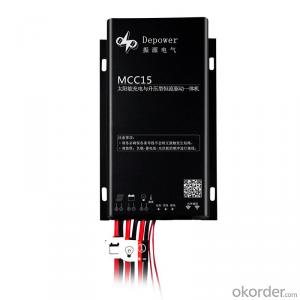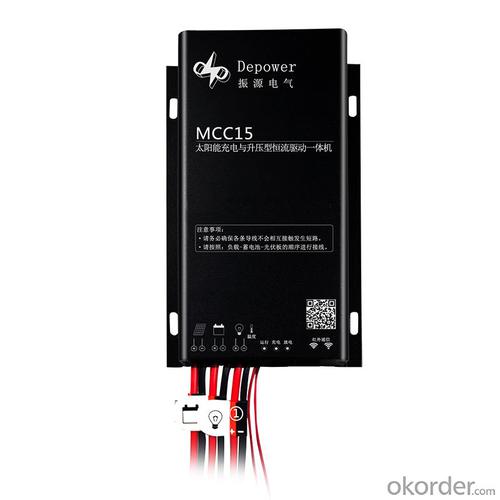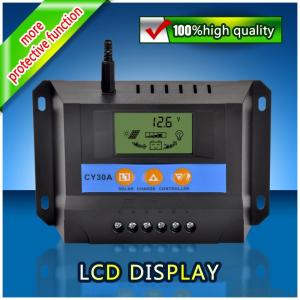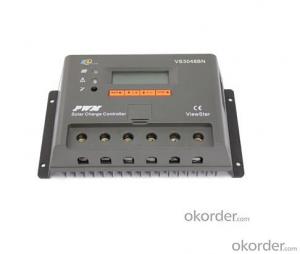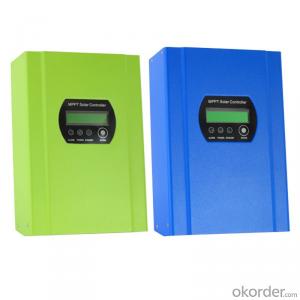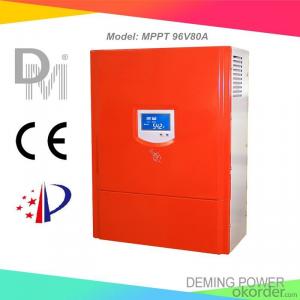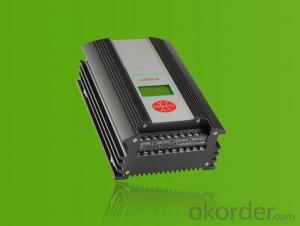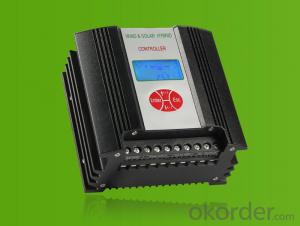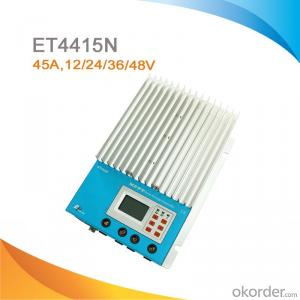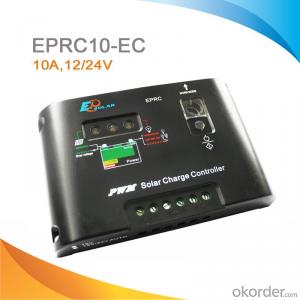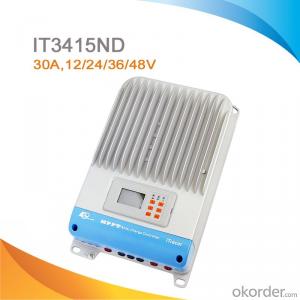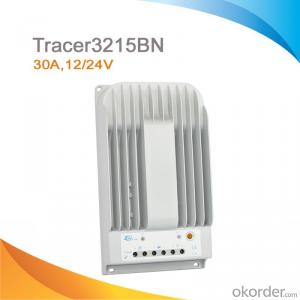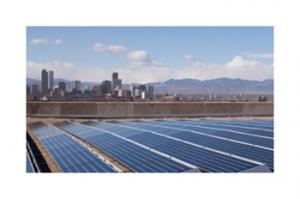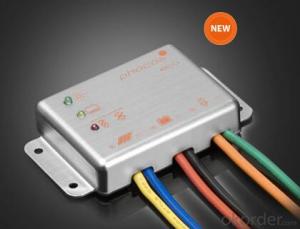High efficiency 12V 10A MPPT Solar Charge Controller for Solar Panel Street light
- Loading Port:
- China main port
- Payment Terms:
- TT OR LC
- Min Order Qty:
- 1 pc
- Supply Capability:
- 1000 pc/month
OKorder Service Pledge
OKorder Financial Service
You Might Also Like
Features :
1). Lighting control,times control,dimming range , motion sensor and so on intelligent drive LED light.
2). High tracking efficiency up to 99.9%, promote system efficiency and decrease cost.
3). Peak conversion efficiency of 98.4%
4). Automatic PV power limit function
5). Multi-function LCD displays system information intuitively
6). User programmable for battery types, load control etc.
7). 3-Stage stage MPPT charging, boost and float charging based on temperature compensation.
8).Fully programmable function via remote meter, PC software and Mobile APP.
9). Waterproof IP68 garde without any button.Technical Parameter:
Model
MCC10
Battery Type
Lead-acid or lithium battery
Battery Voltage(V)
12
Max. Charging Current(A)
10
Low voltage disconnect(V)
10.8
Battery Input Voltage Range(V)
8~15
MPPT charge (V)@25℃
≤14.4(12V)
Boost charge (V)@25℃
≤14.4(12V)
Float charge(V)@25℃
13.8(12V)
Deep discharge protection,
Cut-off voltage(V)@25℃
10.8(12V)
Reconnect Voltage(V)@25℃
11.8(12V)
Battery Temperature Compensation
-4mV/℃/2V
Panel Voltage(V)
≤35
PV Voltage@ Lighting off(V)
≤5
Max. panel power(W)
130
MPPT Tracking Range(V)
14≤Vp≤125(12V)
Output Current Range(mA)
50~4000
Waterproof Grade
IP68(1.5m,72h)
Working Environment Temperature(ºC)
-35ºC ~+60 ºC
3. Image
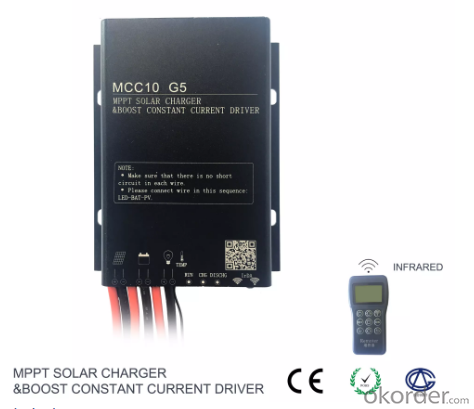
4. FAQ
Q:DO YOU HAVE ANY CERTIFICATION FOR YOUR PRODUCTS?
A:We have ISO9001:2015,CE、RoHS certifications for all of our products.
Q:DO YOU HAVE MOQ FOR PLACE ORDER?
A:Low MOQ,1pe for sample checking is available
- Q: Can a solar controller be used in a commercial solar power system?
- Yes, a solar controller can be used in a commercial solar power system. A solar controller helps regulate the charging and discharging of batteries in a solar power system, ensuring optimal performance and protecting the batteries from overcharging or discharging. This is crucial in both residential and commercial solar power systems to maximize energy efficiency and extend the lifespan of the batteries.
- Q: How does a solar controller handle temperature compensation for the battery?
- A solar controller handles temperature compensation for the battery by monitoring the temperature of the battery and adjusting the charging voltage accordingly. As temperature affects the performance and lifespan of the battery, the controller ensures that the charging voltage is optimized based on the battery's temperature. This helps to prevent overcharging in high temperatures and undercharging in low temperatures, ensuring the battery remains in the optimal charging state for efficient and safe operation.
- Q: How does a solar controller protect the batteries from over-discharging?
- The batteries in a solar power system are safeguarded against over-discharging by a solar controller. This controller continuously monitors the state of charge (SOC) of the batteries and regulates the flow of energy between the solar panels and the batteries. As soon as the SOC reaches a specific low threshold, the controller will automatically disconnect the batteries from the charging source, thus preventing any further discharge. By cutting off the power supply at the appropriate moment, the controller ensures that the batteries are not depleted beyond their safe limits. This is crucial as surpassing these limits can result in irreversible damage to the batteries and reduce their lifespan. Therefore, this feature plays a vital role in maintaining the health and longevity of the batteries within a solar power system.
- Q: Can a solar controller be used with a solar-powered electric gate?
- Yes, a solar controller can be used with a solar-powered electric gate. A solar controller is designed to regulate and optimize the charging of a solar panel system. In the case of a solar-powered electric gate, the solar controller would manage the charging of the batteries that power the gate. It ensures that the batteries are charged efficiently and prevents overcharging, which can lead to damage. By using a solar controller, the solar-powered electric gate can effectively harness energy from the sun and operate reliably.
- Q: How does a PWM solar controller regulate the charging process?
- A PWM solar controller regulates the charging process by using pulse width modulation (PWM) technique. It constantly monitors the battery voltage and adjusts the width of the charging pulses to maintain a consistent charging voltage. When the battery is low, the controller outputs a high duty cycle, delivering maximum charging current. As the battery voltage approaches the desired level, the duty cycle decreases, reducing the charging current. This allows the controller to regulate the charging process and prevent overcharging, ensuring optimal battery performance and longevity.
- Q: Can a solar controller be used with a generator backup system?
- Yes, a solar controller can be used with a generator backup system. The solar controller helps regulate the charging of batteries from solar panels, while the generator backup system provides alternative power during periods of low sunlight or high demand. The two systems can work together to ensure a reliable and efficient power supply.
- Q: How does a solar controller prevent undercharging of batteries?
- A solar controller prevents undercharging of batteries by regulating the amount of charge that is delivered from the solar panels to the batteries. It monitors the battery's voltage and temperature, and adjusts the charging process accordingly to ensure that the batteries receive the optimal amount of charge without overcharging or undercharging.
- Q: Can a solar controller be used with a solar-powered street light?
- Yes, a solar controller can be used with a solar-powered street light. A solar controller is responsible for regulating the charging and discharging of the batteries in a solar system. Since solar-powered street lights also rely on batteries to store energy from the solar panels, a solar controller is essential to ensure efficient charging and discharging of the batteries, thereby optimizing the performance and longevity of the street light.
- Q: Can a solar controller be used with different types of solar panels?
- Yes, a solar controller can be used with different types of solar panels. Solar controllers are designed to regulate the charging process and protect the batteries from overcharging, regardless of the type of solar panel used.
- Q: What is the maximum charging current that a solar controller can handle?
- The maximum charging current that a solar controller can handle depends on the specific model and specifications of the controller. Generally, solar controllers are designed to handle a range of charging currents depending on the size and capacity of the solar system. The maximum charging current is usually mentioned in the product specifications or user manual provided by the manufacturer. It can vary from a few amperes for smaller controllers used for smaller solar systems, to several hundred amperes for larger controllers used in larger solar installations. It is important to consider the maximum charging current when selecting a solar controller to ensure that it can handle the current generated by the solar panels and meet the charging requirements of the battery system. Exceeding the maximum charging current limit of a solar controller can potentially damage the controller or the connected battery system. Therefore, it is recommended to carefully review the product specifications and consult with the manufacturer or a solar professional to determine the appropriate solar controller for a specific solar system.
Send your message to us
High efficiency 12V 10A MPPT Solar Charge Controller for Solar Panel Street light
- Loading Port:
- China main port
- Payment Terms:
- TT OR LC
- Min Order Qty:
- 1 pc
- Supply Capability:
- 1000 pc/month
OKorder Service Pledge
OKorder Financial Service
Similar products
Hot products
Hot Searches
Related keywords
